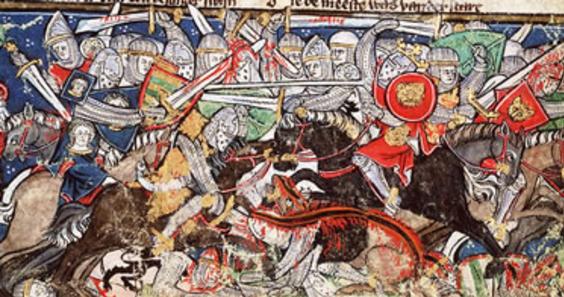Shellfish. Starving children in Africa. The Crusades. In a normal, rational world, these three subjects would be as far apart from each other topically as they are physically. In religious debate between an uninformed atheist and an unprepared Christian, however, these three topics are the conversation’s bread and butter. Having grown up in the church with an interest in theology and philosophy, I have been able to debunk these for years. To my annoyance, while the value behind these posits has been erased completely, the posits themselves subsist in some sort of perverted strength in numbers. I post this article in perhaps the vain hope that, with the right ideological equipment, newer, more productive discussions can take the place of the old ones. Since that’s a tall order, I will reduce my argument to that of the Crusades.
First, some counters that do not work. Yes, dozens of jihads were launched before the first crusade ever started. Arguably, the Crusades could be considered defensive, but this is an ultimately weak argument. Besides, a tu quoque is not going to convince someone who believes that all religions are bad; Islam and Christianity are two sides of the same Ibrahimic coin in their eyes. Safe passage for pilgrims has been another very popular excuse, brought down through the generations. Persecution much greater than this has happened to Christians before. Unorganized raiding along the roads to Jerusalem, while still potentially at the forefront of the noble-intentioned crusader’s mind, is not backed well enough to posit.
No, the argument against the Crusades is their near unanimous records of failure. I could explain most, but I’ll give some brief highlights. The First Crusade took the Holy Lands out of pure luck, and even then the crusaders had massive food shortages, coordination problems, and infighting. Never again would a Crusade capture land in the Middle East. The Fourth Crusade only ever assaulted Catholic Hungary and Orthodox Byzantium. The Northern Crusades, while still practical failures, created a powerhouse faction in the Teutons, against which Poland had to side with the ex-pagans to fight. The Hussite Crusades pitted the most powerful and expensive armies Europe could afford against a series of wagon fortifications, and the wagon fortifications won. Failed battles, lost glory, poor conditions. The Crusades are pathetic.
The values of many religions are made apparent by the general actions of their followers. When Muhammad died, his followers took up the sword and carved themselves a vast empire. Even today, their religious extremists take great pride in physical land. Islam is a religion that is good soil for war. The Jews throughout history have lived in small pockets of closely-concentrated communities. Their structure is logical and pragmatic, which has allowed their communities to survive through the worst social catastrophes imaginable. Today, functioning as the state of Israel, the Jewish people hold their own against millions of men and billions of dollars’ worth of equipment. Judaism is a religion that is good soil for defense. For non-monotheistic examples, Hinduism and its diminutive Karma practically justify impassable social structures and class divides. Buddhism and Confucianism never had any teeth to contribute anything of note as an organized following. The list continues, but the point is made.
Christianity spreads and thrives in peacetime, more than any other religion. It thrives even as its practitioners are murdered by the thousands. It thrives among downtrodden areas, and it shifts billions of dollars across continents just to spread its message. It spans every culture and creed, booting out dozens of weaker beliefs without shedding a single drop of blood. A religion that says “let him without sin cast the first stone,” a religion whose central figure heals the soldier trying to arrest him, a religion that created the Parable of the Good Samaritan, is a religion that pushes for the best possible conditions for humanity, and one that shuns the worst.
So, yes, the Crusades are, oddly enough, an argument for Christianity. I have many criticisms about the practice of Christianity, and the interpretation of its tenets. I recommend, however, that we focus less on easy “gotcha” moments and focus on tougher material. Uneducated positions have a tendency to backfire, after all.


Leave a Reply